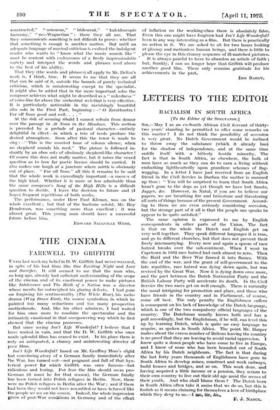LETTERS TO THE EDITOR
RACIALISM IN SOUTH AFRICA
[To the Editor of the SPECTATOR.] SIR,—May I as an ex-South African Civil Servant of thirty. two years' standing be permitted to offer some remarks on this matter ? I do not think the possibility of secession is very great. No Dutch Government would be inclined to throw away the substance (which it already has) for the shadow of independence, and at the same time saddle itself with a bitterly hostile minority. The fact is that in South Africa, as elsewhere, the bulk of men have as much as they can do to earn a living without embarking lightheartedly upon grandiose schemes of flag- wagging. In a letter I have just received from an English friend in the Civil Service in Durban the matter is summed up thus : You will be surprised to learn that South Africa hasn't gone to the dogs as yet though we have lost Smuts, Jagger, &c. However, in Natal, if you are to believe our papers, we are breathing fire and brimstone and threatening all sorts of things because of the present Government. Accord- ing to them we are even seriously considering secession, but the strange part of it all is that the people one speaks to appear to be quite satisfied."
The same opinion is expressed to me by English correspondents in other parts of the Union. The fact is that on the whole the Dutch and English get on very well together. They speak different languages it is true, and go to different churches, but that does not prevent their freely intermarrying. Every now and again a spasm of race hatred breaks over the sub-continent. When I went to Capetown in 1892 race hatred had sunk almost to zero. Then the Raid and the Boer War fanned it into flames. With the end of the war, and the grant of self-government to the late republics, race hatred was dying down again, but was revived by the Great War. Now it is dying down once more, and the pact between the Dutch Nationalist Party and the British Labour Party will accelerate its death. In the Civil Service the two races get on well enough. There is naturally the usual intriguing for promotion and place, and those who have friends in the country and in Parliament, of course, come off best. The only penalty the Englishman suffers is consequent on his lack of knowledge of the Dutch language, which is one of the two compulsory official languages of the country. The Dutchman usually knows both and has a pull accordingly, but the Englishman, if he will, can level this up by learning Dutch, which is quite -an easy. language to acquire, as spoken in South Africa. The point Mr. Harper makes about the excess number of Britons leaving the country is no proof that they are leaving to avoid racial oppression. I know quite a dozen people who have come to live in Europe, and I know of none who has been hounded out of South Africa by his Dutch neighbours. The fact is that during the last forty years thousands of Englishmen have gone to South Africa to develop mines, construct and work railways, build houses and bridges, and so on. This work done, and having acquired a little income or a pension, they return to their own country to live out their old age amid the scenes of their youth. And who shall blame them ? The Dutch born in South Africa often take it amiss that we do so, but this is foolish as it means claiming for themselves a love of birthplace which they deny to us.—I am, Sir, dr.Z., F. J. NewcE.










































 Previous page
Previous page